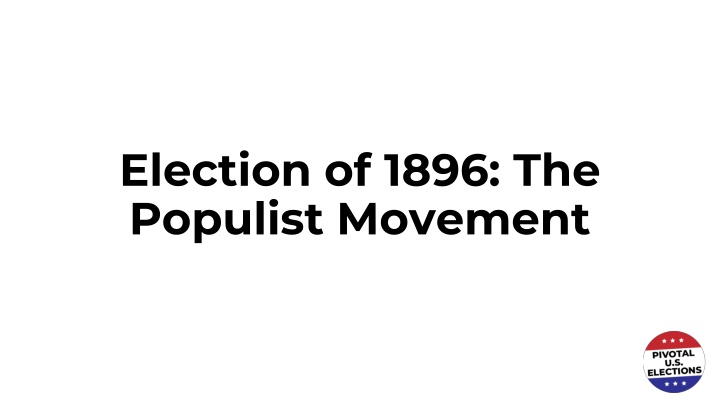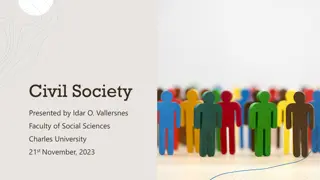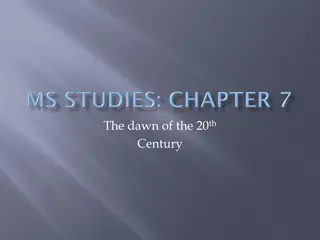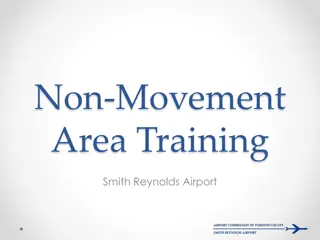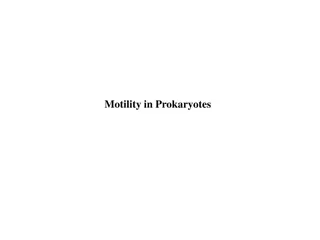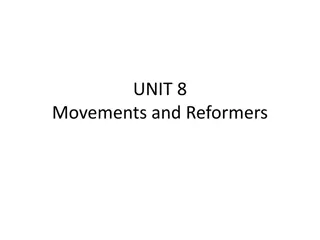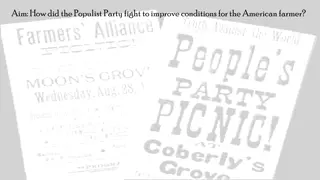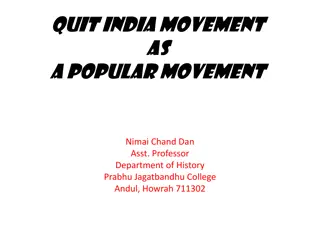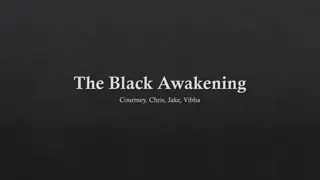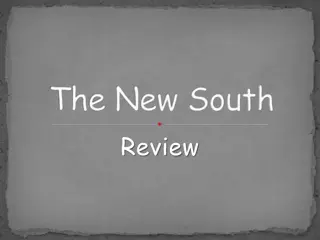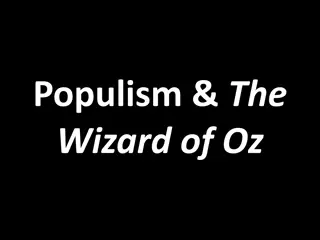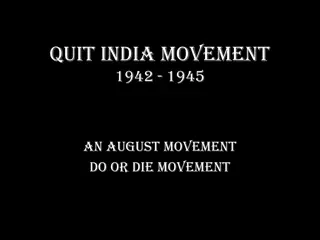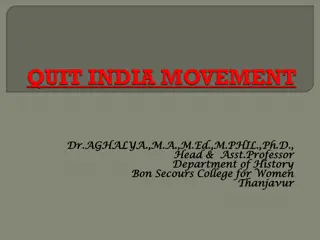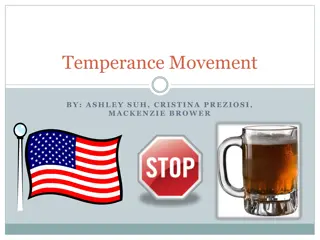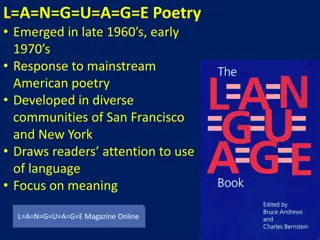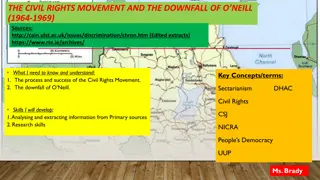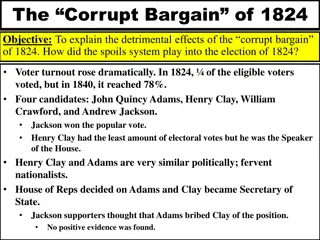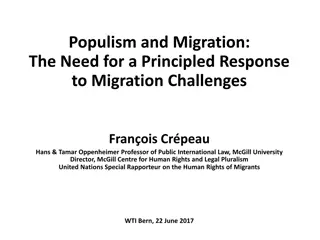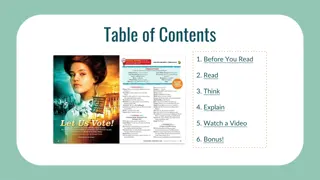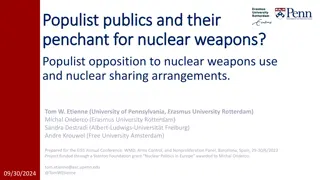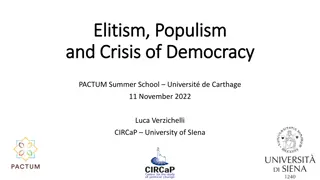The Populist Movement of 1896 and Its Impact on US Society
The election of 1896 exposed sectional differences between agricultural and industrial regions in the US, leading to the emergence of the Populist Party. This third party championed economic reforms to empower farmers and workers, influencing subsequent Progressive Era movements. The Democratic Party absorbed some Populist ideas, while the Republican Party's support from the industrial Northeast secured its dominance for decades.
Download Presentation

Please find below an Image/Link to download the presentation.
The content on the website is provided AS IS for your information and personal use only. It may not be sold, licensed, or shared on other websites without obtaining consent from the author.If you encounter any issues during the download, it is possible that the publisher has removed the file from their server.
You are allowed to download the files provided on this website for personal or commercial use, subject to the condition that they are used lawfully. All files are the property of their respective owners.
The content on the website is provided AS IS for your information and personal use only. It may not be sold, licensed, or shared on other websites without obtaining consent from the author.
E N D
Presentation Transcript
Election of 1896: The Populist Movement
Essential Question What were the political and economic issues that led to the beginnings of Populism, and how did the emergence of the Populist Party impact U.S. society?
Key Ideas The election of 1896 revealed significant sectional differences as the agricultural regions of the United States clashed with the industrial Northeast for power. Industry and agriculture were in direct competition for land use, creating tensions on both sides. Called the first modern presidential campaign by some historians, the election of 1896 saw the first broad use of nation-wide campaigning by candidates and supporters. An agrarian-focused party, the Populist Party was a short-lived but significant third party. Their support of unlimited silver coinage, a progressive income tax, and greater workers rights were all designed to increase the power of farmers and bring them economic parity with business and industry. Some Populist ideas were later championed by Progressive Era reformers.
Key Ideas The Democratic Party co-opted a number of Populist ideas and even nominated the same candidate. The Republican Party won the support of the heavily populated, industrial Northeast through their support of the gold standard and enforcing immigration laws, and with that support came to dominate the American political system for the next three decades.
Candidates and Outcome McKinley 271 Bryan 176 William Jennings Bryan (Democrat and Populist) William McKinley (Republican)
Warm-Up Excerpt from the Populist Party Platform Populist Party 1896
Excerpt from the Populist Party Platform Populist Party 1896 We realize that, while we have political independence, our financial and industrial independence is yet to be attained by restoring to our country the Constitutional control and exercise of the functions necessary to a people's government, which functions have been basely surrendered by our public servants to corporate monopolies. Executive power and patronage have been used to corrupt our legislatures and defeat the will of the people, and plutocracy has thereby been enthroned upon the ruins of democracy. To restore the Government intended by the fathers, and for the welfare and prosperity of this and future generations, we demand the establishment of an economic and financial system which shall make us masters of our own affairs and independent of European control, by the adoption of the following: The Finances FIRST. We demand a National money, safe and sound, issued by the General Government only, without the intervention of banks of issue, to be a full legal tender for all debts, public and private; a just, equitable, and efficient means of distribution, direct to the people, and through the lawful disbursements of the Government. SECOND. We demand the free and unrestricted coinage of silver and gold at the present legal ratio of 16 to 1, without waiting for the consent of foreign nations. SEVENTH. We demand a graduated income tax, to the end that aggregated wealth shall bear its just proportion of taxation, and we regard the recent decision of the Supreme Court relative to the income-tax as a misinterpretation of the Constitution and an invasion of the rightful powers of Congress over the subject of taxation. Populist Party National Convention (St. Louis, Missouri). Platform of the Populist Party, 1896. In National Party Platforms, 1840-1972, edited by Donald Bruce Johnson and Kirk Harold Porter, 104 (University of Illinois Press, 1973). From University of Houston Digital History. https://www.digitalhistory.uh.edu/disp_textbook.cfm?smtID=3&psid=4067.
Excerpt from the Populist Party Platform Populist Party 1896 Railroads and Telegraphs FIRST. Transportation being a means of exchange and a public necessity, the Government should own and operate the railroads in the interest of the people and on a non-partisan basis, to the end that all may be accorded the same treatment in transportation, and that the tyranny and political power now exercised by the great railroad corporations may be destroyed. The Public Lands FIRST. True policy demands that the National and State legislation shall be such as will ultimately enable every prudent and industrious citizen to secure a home, and therefore the land should not be monopolized for speculative purposes. The Referendum We favor a system of direct legislation through the initiative and referendum, under proper Constitutional safeguards. Direct Election of President and Senators by the People FIRST. We demand the election of President, Vice-President, and United States Senators by a direct vote of the people . Populist Party National Convention (St. Louis, Missouri). Platform of the Populist Party, 1896. In National Party Platforms, 1840-1972, edited by Donald Bruce Johnson and Kirk Harold Porter, 104 (University of Illinois Press, 1973). From University of Houston Digital History. https://www.digitalhistory.uh.edu/disp_textbook.cfm?smtID=3&psid=4067.
Excerpt from the Populist Party Platform Populist Party 1896 A Fair Ballot Believing that the elective franchise and an untrammeled ballot are essential to a government of, for, and by the people, the People's party condemns the wholesale system of disfranchisement adopted in some States as unrepublican and undemocratic, and we declare it to be the duty of the several State legislatures to take such actions as will secure a full, free and fair ballot and an honest count. Populist Party National Convention (St. Louis, Missouri). Platform of the Populist Party, 1896. In National Party Platforms, 1840-1972, edited by Donald Bruce Johnson and Kirk Harold Porter, 104 (University of Illinois Press, 1973). From University of Houston Digital History. https://www.digitalhistory.uh.edu/disp_textbook.cfm?smtID=3&psid=4067.
